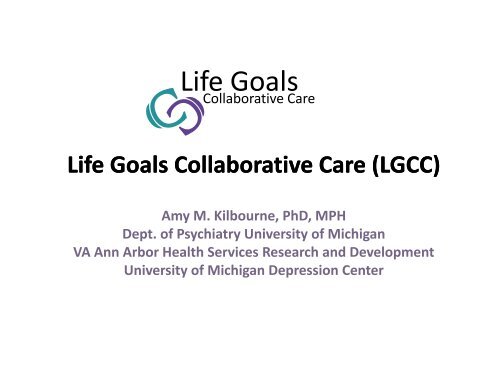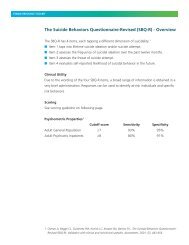Life Goals Collaborative Care (LGCC) - SAMHSA-HRSA Center for ...
Life Goals Collaborative Care (LGCC) - SAMHSA-HRSA Center for ...
Life Goals Collaborative Care (LGCC) - SAMHSA-HRSA Center for ...
Create successful ePaper yourself
Turn your PDF publications into a flip-book with our unique Google optimized e-Paper software.
<strong>Life</strong> if G<strong>Goals</strong> l<br />
<strong>Collaborative</strong> <strong>Care</strong><br />
<strong>Life</strong> <strong>Life</strong> <strong>Goals</strong> <strong>Goals</strong> <strong>Collaborative</strong> <strong>Collaborative</strong> <strong>Care</strong> (<strong>LGCC</strong>)<br />
(<strong>LGCC</strong>)<br />
Amy MM. Kilbourne Kilbourne, PhD PhD, MPH<br />
Dept. of Psychiatry University of Michigan<br />
VA Ann Arbor Health Services Research and Development<br />
UUniversity i i of f Mi Michigan hi DDepression i C<strong>Center</strong>
<strong>Life</strong> <strong>Goals</strong> <strong>Collaborative</strong> <strong>Care</strong><br />
• <strong>LGCC</strong> is an evidence evidence‐based based psychosocial intervention designed to<br />
improve medical and psychiatric outcomes <strong>for</strong> persons with<br />
mood disorders through personal goal‐setting aligned with<br />
wellness and symptom coping strategies and supported through<br />
collaborative ll b ti care.<br />
• Consumer‐centered program based on the Chronic <strong>Care</strong> Model<br />
shown to improve physical and mental health outcomes <strong>for</strong><br />
persons with bipolar disorder in 3 randomized controlled trials<br />
• Closes the gap between physical and mental health by<br />
integrating g gtailored psychosocial py sessions with collaborative care<br />
management<br />
• Recently expanded to serious mental illness, and found to be<br />
effective <strong>for</strong> those with co‐occurring substance use disorders
<strong>LGCC</strong> Description<br />
• <strong>LGCC</strong> hl helps persons maintain i t i a vision ii ttowards d<br />
achieving their personal goals while providing<br />
practical day‐to‐day day to day support in working on specific<br />
health‐related objectives that help them achieve<br />
these goals over time<br />
• <strong>LGCC</strong> focuses on prevention of adverse medical<br />
outcomes through g a unique q combination of health<br />
behavior change, psychotherapy, and motivational<br />
enhancement
The <strong>Life</strong> <strong>Goals</strong> <strong>Collaborative</strong> <strong>Care</strong> Model<br />
Medical<br />
and psychiatric care<br />
decision support<br />
Integrated <strong>Life</strong> <strong>Goals</strong>:<br />
Provider Symptoms &<br />
Support Wellness<br />
Medical &<br />
Psychiatric<br />
<strong>Care</strong> Management<br />
Self‐management<br />
focused on<br />
personal goals<br />
Enhanced access/continuity<br />
supported by registry<br />
Bauer MS et al. Psych Serv 2006; Kilbourne AM et al. Psych Serv 2008
<strong>Life</strong> <strong>Goals</strong> <strong>Collaborative</strong> <strong>Care</strong><br />
Development<br />
1996 - 2006 <strong>LGCC</strong> ddeveloped l d bbased d on consumer ffeedback db k<br />
Tested in two large randomized controlled trials nationwide<br />
Manual (v.1.0) published (translated in Spanish, French)<br />
2006 - 2008 2 nd Generation randomized clinical trial adapted <strong>LGCC</strong> to<br />
address improving medical and psychiatric outcomes<br />
Manuals (v. ( 2.0) ) and intervention packages p g <strong>for</strong><br />
providers, administrators, and consumers<br />
2009 - present Publication of Overcoming Bipolar Disorder (<strong>LGCC</strong><br />
workbook) <strong>for</strong> providers & consumers<br />
Several provider trainings implemented (e.g., <strong>for</strong> MSW,<br />
nursing psychiatry, psychology, international scholars)<br />
Manuals developed <strong>for</strong> mood disorders, SMI
hf5<br />
<strong>LGCC</strong> Consumer Workbook Published by New Harbinger
Slide 6<br />
hf5 Add description and details about text to supplement image.<br />
heidi frankenhauser, 11/3/2010
hf6<br />
<strong>Life</strong> <strong>Goals</strong> <strong>Goals</strong> <strong>Collaborative</strong> <strong>Collaborative</strong> <strong>Care</strong>:<br />
<strong>Care</strong>:<br />
The Consumer’s Consumer’s Experience<br />
Session 1 Session 3<br />
WEEK ONE WEEK THREE SIX MONTH FOLLOW‐UP WITH<br />
WEEK TWO WEEK FOUR HEALTH SPECIALIST<br />
Session 2 Session 4<br />
Following the session work, work the Health<br />
Specialist will initiate contact with the<br />
consumer at agreed upon monthly<br />
scheduled times, <strong>for</strong> 10‐15 minute<br />
intervals <strong>for</strong> the following:<br />
�Assist with wellness goals<br />
�Review medications<br />
�Collaborate �Collaborate on care<br />
�Assist with mood monitoring<br />
�Review of lessons learned
Slide 7<br />
hf6 Might be helpful to break down and re-create into two slides that describe sessions and follow-ups separately (to simplify and reduce<br />
text). That- or perhaps a more simplified timeline followed by one r two slides that break down session content.<br />
heidi frankenhauser, 11/3/2010
<strong>Life</strong> <strong>Goals</strong> Session Content<br />
Session 1 Session 3<br />
• Self management &<br />
• Depression overview and<br />
C<strong>Collaborative</strong> ll b i C<strong>Care</strong><br />
• Understanding Mood<br />
Symptoms<br />
•Identifying Core Values<br />
• MMood dDi Disorders d & Wellness Wll • Ati Action plan l <strong>for</strong> f depression d i<br />
Session 1<br />
Session 2<br />
symptoms<br />
• Triggers to depressive<br />
episodes<br />
• “What’s Your Experience”?<br />
Session 3<br />
• Mania/anxiety overview &<br />
symptoms<br />
• Triggers to episodes<br />
• “What’s Your Experience”?<br />
• Action plan <strong>for</strong> symptoms<br />
Session 4<br />
• Your Wellness Plan<br />
• Building and Strengthening<br />
Collaboration of <strong>Care</strong><br />
Rl P ti<br />
“Wh t’ Y E i ”? • Relapse Prevention<br />
Session 2 Session 4
Why Implement <strong>LGCC</strong> in your Setting?<br />
• <strong>LGCC</strong> was originally developed <strong>for</strong> bipolar disorder one<br />
• <strong>LGCC</strong> was originally developed <strong>for</strong> bipolar disorder, one<br />
of the most costly mental disorders and is part of the<br />
<strong>Collaborative</strong> <strong>Care</strong> Model family<br />
• <strong>LGCC</strong> addresses the “unwanted co‐travelers” associated<br />
with mood disorders, including cardiovascular disease,<br />
diabetes, anxiety, and substance use<br />
• <strong>LGCC</strong> is manual‐based, scalable, and practical to<br />
implement<br />
• <strong>LGCC</strong> can be adapted to other mental disorders<br />
commonly seen in primary care settings
<strong>LGCC</strong> References<br />
1.Kilbourne AM, , Post EP, , Nossek A, , Drill L, , Cooley y S, , Bauer MS. Improving p gmedical<br />
and<br />
psychiatric outcomes among individuals with bipolar disorder: a randomized controlled<br />
trial. Psychiatr Serv. 2008 ;59:760‐8.<br />
2. Bauer MS, McBride L, Willi<strong>for</strong>d WO, Glick H, Kinosian B, Altshuler L, Beres<strong>for</strong>d T,<br />
Kilbourne AM, , Sajatovic j M; ; Cooperative p Studies Program g 430 Study y Team. <strong>Collaborative</strong><br />
care <strong>for</strong> bipolar disorder: part I. Intervention and implementation in a randomized<br />
effectiveness trial. Psychiatr Serv. 2006;57:927‐36.<br />
3. Bauer MS, McBride L, Willi<strong>for</strong>d WO, Glick H, Kinosian B, Altshuler L, Beres<strong>for</strong>d T,<br />
Kilbourne AM, Sajatovic M; Cooperative Studies Program 430 Study Team. <strong>Collaborative</strong><br />
care <strong>for</strong> bipolar disorder: Part II. Impact on clinical outcome, function, and costs.<br />
Psychiatr Serv. 2006;57:937‐45.<br />
4. Simon GE, Ludman EJ, Bauer MS, Unützer J, Operskalski B. Long‐term effectiveness<br />
and cost of a systematic care program <strong>for</strong> bipolar disorder. Arch Gen Psychiatry.<br />
2006;63:500‐8.<br />
5. Kilbourne AM, Biswas K, Pirraglia PA, Sajatovic M, Willi<strong>for</strong>d WO, Bauer MS. Is the<br />
collaborative chronic care model effective <strong>for</strong> patients with bipolar disorder and co‐<br />
occurring conditions? J Affect Disord. 2009;112: 256 256‐61. 61.







